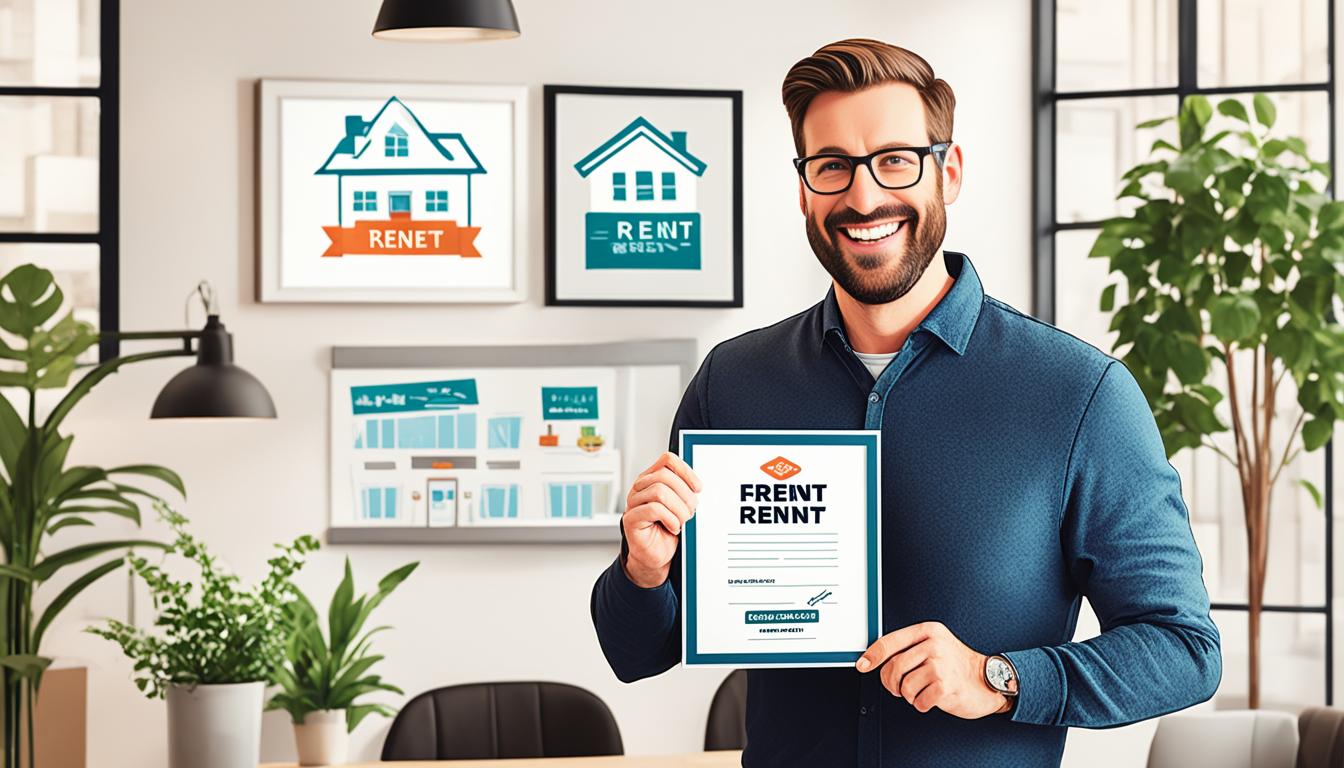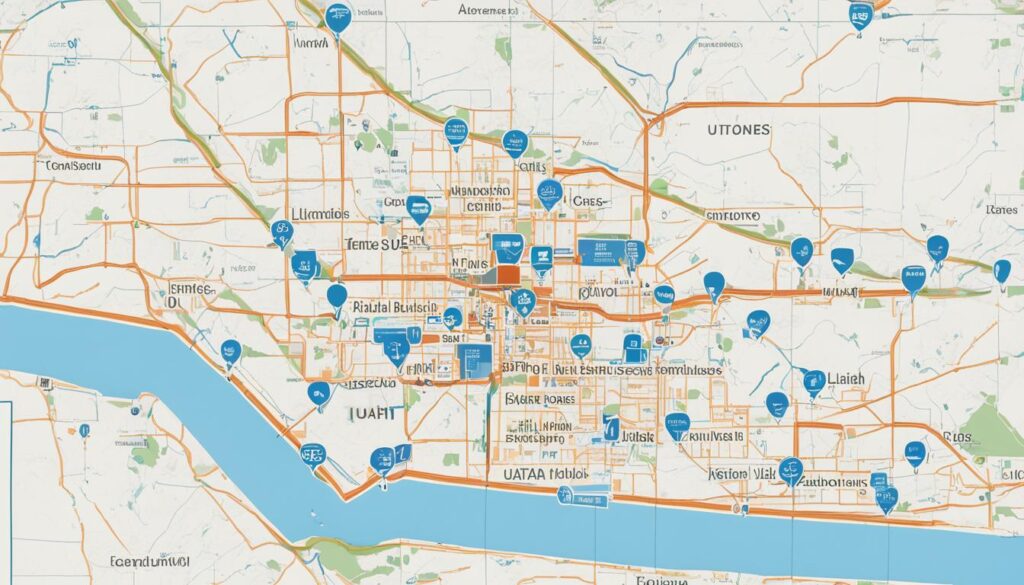Did you know that the requirement for a rental license to rent your house varies from state to state? Some states mandate that you obtain a rental license before leasing out your property, while others do not have such a requirement. It’s crucial to understand the landlord business license requirements in your specific city and state to ensure you are operating within the law.
Failure to obtain a rental license when required can have serious legal consequences, including fines and the need to cease your rental business. To help you navigate the process and stay compliant, we’ve compiled essential information on rental licenses, how to obtain them, and other important considerations for landlords.
Key Takeaways:
- Rental license requirements vary by state and city.
- Research the specific landlord business license requirements for your area.
- If a rental license is required, complete the application process and property inspection.
- Consider the benefits of creating a Limited Liability Company (LLC) for your rental properties.
- Understand key responsibilities as a landlord, such as lease agreements and tenant screening.
How to Obtain a Rental License
If a rental license is required in your city or state, the process to obtain one is typically straightforward. To start, you will need to fill out a rental license application. This application can usually be found on your city’s department of housing website or obtained from city hall. Keep in mind that there may be application fees involved, so be sure to budget accordingly.
Once you have completed the application, you may need to schedule a property inspection as part of the rental license process. This inspection ensures that your property meets safety standards and is livable for potential tenants. It is important to address any necessary changes or repairs identified during the inspection to bring your property up to code.
After you have completed the necessary steps, including the property inspection and any required changes, you will be eligible to receive your rental license. This license demonstrates that you have met all the requirements set by your local housing authority and are legally allowed to rent out your property.
Business Licenses for Rental Property
The need for a business license to rent out your home depends on the state where your property is located. Some states require landlords to obtain a business license, while others do not.
Creating a Limited Liability Company (LLC) for your rental properties can provide several advantages. First, it reduces liability risk, protecting your personal assets in case of any legal issues or damages related to the property. Additionally, an LLC allows for pass-through taxation, which means that the business income is passed through to the LLC members.
With an LLC, you can report your share of profits or losses on your individual tax returns, simplifying the tax process. This can be particularly beneficial when you have multiple rental properties, as it allows for easier management of your finances.
Another option that some landlords opt for is a “self-rental” arrangement. In this scenario, you purchase a property and lease it back to your own business. This arrangement can have tax advantages and offers more flexibility in managing your rental business.
When considering whether to obtain a business license or create an LLC for your rental properties, it is important to consult with a legal professional or tax advisor who can provide personalized guidance based on your specific circumstances and the laws of your state.

Key Considerations for Renting Your House
When renting your house, there are several key considerations to keep in mind. To ensure a successful and legally compliant rental experience, it is important to:
- Familiarize yourself with landlord-tenant law: Familiarize yourself with the laws and regulations that govern the landlord-tenant relationship in your area. This will help you understand your rights and responsibilities and ensure you adhere to all legal obligations.
- Create a lease agreement: A well-drafted lease agreement is essential to protect both landlords and tenants. Clearly outline the terms of the rental arrangement, such as rent payment, lease duration, and any additional agreements or restrictions. Be sure to include provisions that address maintenance responsibilities and potential consequences for violating the terms of the lease.
- Collect a security deposit: Most residential leases require a security deposit. This is an amount of money collected from the tenant at the beginning of the tenancy and held by the landlord as protection against unpaid rent or damages to the property. Make sure you understand the laws regarding security deposits in your area and follow the proper procedures for collecting, holding, and returning the deposit.
- Set the right rental price: Determining the appropriate rental price for your property is crucial. Consider factors such as the location, amenities, and market demand when determining the rental price. Conduct market research to ensure your rental price is competitive and realistic.
- Obtain landlord insurance: Protecting your property and rental income is essential. Landlord insurance provides coverage for property damage, liability protection, and loss of rental income. Find a reputable insurance provider that offers comprehensive coverage for landlords.
- Develop a property management plan: Having a solid property management plan in place will help you stay organized and efficient. This plan should include strategies for marketing your rental property, tenant screening procedures, and regular maintenance and repairs. Consider using property management software to streamline tasks and keep track of important information.
- Find a good tenant: Finding a responsible and reliable tenant is key to a successful rental experience. Conduct thorough tenant screenings, including background checks, credit checks, and references, to ensure you select a tenant who will take care of your property and fulfill their rental obligations.
By considering these key aspects, you can navigate the rental process with confidence and increase the likelihood of a positive and profitable rental experience.
Importance of Staying in Compliance
Renting out a property without the required licenses and approvals can have serious consequences. Operating without a rental license is illegal and can result in fines, the need to cease your rental business, and the possibility of being denied future rental licenses.
To protect your property, tenants, and personal assets, it is crucial to stay in compliance with the regulations and obtain the necessary licenses and approvals. By doing so, you ensure that your rental business operates within the legal framework and avoids any potential legal issues or penalties.
Additionally, it is important to be aware of the renewal deadlines for licenses. Business licenses need to be renewed periodically, and failing to do so can lead to the expiration of your license and the need to go through the application process again. Staying on top of renewal deadlines and fees is essential to maintain compliance with the government.

Consequences of Renting Without a License:
- Legal fines and penalties
- The need to cease your rental business
- Possibility of being denied future rental licenses
- Potential damage to your reputation as a landlord
Reasons to Stay in Compliance:
- Protect your property and tenants
- Avoid legal issues and penalties
- Maintain a professional and trustworthy image as a landlord
Renewal Deadlines for Licenses:
- Stay informed about the renewal deadlines for your rental licenses
- Set reminders to ensure timely renewal
- Pay attention to any required fees or documentation
Additional Responsibilities of a Landlord
As a landlord, there are additional responsibilities beyond obtaining the necessary licenses. Familiarize yourself with landlord-tenant law to understand both your rights and responsibilities. This law governs the relationship between you and your tenants, ensuring fair treatment and protection for both parties.
Create a comprehensive lease agreement that covers important aspects such as rent, lease duration, and tenant responsibilities. A well-drafted lease agreement sets clear expectations and helps prevent disputes in the future. Include details about maintenance responsibilities, pet policies, and any additional rules specific to your property.
Collecting a security deposit is common practice to protect against any damages caused by tenants. The deposit acts as a financial cushion in case there are any unpaid rent or damages to the property. Ensure you comply with local laws regarding the maximum amount of the security deposit and the proper handling of it.
Setting the right rental price is essential to attract tenants and ensure profitability. Conduct market research to determine the fair rental value for your property. Consider factors such as location, amenities, and demand in the area. Balancing competitive pricing with profitability is crucial for a successful rental business.
Obtaining landlord insurance is crucial to protect your property and rental income. This type of insurance provides coverage for property damage, liability claims, and loss of rental income. It safeguards your investment and provides peace of mind in case of unexpected events.
Develop a property management plan to efficiently handle tasks such as marketing, tenant screening, and maintenance. This plan helps streamline your operations, ensuring that your property is well-maintained and tenants are satisfied. Consider outsourcing property management services if you have limited time or resources.
Finding a good tenant who respects the property and pays rent on time is key to a successful rental experience. Implement a thorough tenant screening process, which includes checking credit history, criminal background, and references. This helps minimize the risk of problematic tenants and ensures a positive landlord-tenant relationship.
Remember, being a landlord comes with a range of responsibilities. By familiarizing yourself with relevant laws, creating a solid lease agreement, implementing proper tenant screening, and maintaining a well-managed property, you can enhance the rental experience for both you and your tenants.
Simplifying the Rental Process with Professional Help
Managing a rental property can be a complex and time-consuming task. That’s why many landlords choose to enlist the services of professional property management companies. These companies offer full-service management, taking care of every aspect of the rental process, from marketing your property to tenant screening, rent collection, and property maintenance.
By partnering with a property management company, you can benefit from their expertise and experience in the rental industry. They have a deep understanding of local rental markets and can help you set the right rental price to maximize your profits. They also ensure that your property is well-promoted to attract quality tenants.
One premier property management company that provides full-service management is Zeus rental services. With their user-friendly platform, they make it easy for both landlords and tenants to navigate the rental process. Their team of professionals handles everything from advertising and showing the property to conducting thorough tenant screenings and managing all maintenance requests. This allows you to focus on other aspects of your life while ensuring that your property is in good hands.
When you hire a property management company like Zeus, you can enjoy the benefits of professional property management. They take care of all the time-consuming tasks, so you don’t have to. You can sit back and relax while they handle the day-to-day operations, ensuring a smooth and hassle-free rental experience for both you and your tenants.




